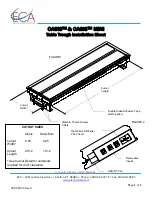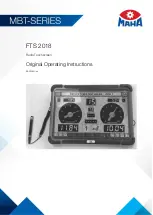
3
!
WARNING
• DO NOT exceed the maximum fall arrest forces as speci
¿
ed by governing standards or subsystem components.
• The anchorage must be capable of supporting the required load. See Table 1 of the User Instructions for details on
anchorage strength.
• Only anchor in locations represented in Tables 4 and 5 of the User Instructions.
• Ensure that the available fall clearance is greater than the fall clearance shown in Table 4 of the User Instructions. Pre-
vent swing falls and impact with objects in or adjacent to the fall path. Swing falls can increase the fall distance. Always
remove obstructions below the work area to ensure a clear fall path. Keep work area free from debris, obstructions,
trip hazards, spills or other hazards which could impair the safe operation of the fall protection system. DO NOT use
the PFL unless a quali
¿
ed person has inspected the workplace and determined that identi
¿
ed hazards can neither be
eliminated nor exposures to them prevented.
• MSA Fall Protection products may not be used while under the in
À
uence of drugs or alcohol.
• DO NOT rely on feel or sound to verify proper snaphook or carabiner engagement. Ensure that gate and keeper are
closed before use.
• Use only for the fall arrest of one person.
• DO NOT use to arrest falls due to the collapse of shifting masses, e.g. grain, sand, and liquids.
• If the PFL is damaged or is subjected to fall arrest forces or impact forces, it must be immediately removed from ser-
vice and marked as “UNUSABLE” until it has been destroyed.
• Due to the nature of some fall arrest events, it is possible for the fall arrest indicator to not deploy. In the event that a
PFL is subjected to fall arrest forces and the fall arrest indicator does not deploy, the PFL still must be removed from
service and marked as “UNUSABLE” until it has been destroyed.
• If the fall arrest indicator is deployed, immediately remove the PFL from service and mark it as “UNUSABLE” until it has
been destroyed.
• DO NOT leave the PFL installed in environments which could cause damage or deterioration to the product. Refer to
the User Instructions for care and inspection details.
• DO NOT use where line may be exposed to abrasive edges. In leading edge applications, the edge must be steel and
have a radius greater than 0.5 mm (0.020”).
• Chemical hazards, heat and corrosion may damage the PFL. More frequent inspections are required in these environ-
ments.
• Avoid using the PFL adjacent to moving machinery, electrical hazards or abrasive surfaces or in the presence of exces-
sive heat, open
À
ame or molten metal. DO NOT use in environments with temperatures greater than 185F (85C). DO
NOT use the PFL near energized equipment or where contact with high voltage power lines may occur. Metal compo-
nents of the PFL may provide a path for electrical current to
À
ow, resulting in an electrical shock or electrocution.
• Remove any surface contamination such as, but not limited to, concrete, stucco, roo
¿
ng material, etc. that could accel-
erate cutting or abrading of attached components.
• DO NOT alter this equipment or intentionally misuse it. DO NOT use fall protection equipment for purposes other than
those for which it was designed. DO NOT use fall protection equipment for towing, hoisting or material handling.
• Only MSA or persons or entities with written authorization from the manufacturer may make repairs to the PFL. No
unauthorized repairs, modi
¿
cations, alterations and/or additions are permitted.
• If PPE is resold, it is essential that instructions for use, maintenance, and periodic examination are provided in the
language of destination.
• RESCUE AND EVACUATION: the user must have a rescue plan and the means at hand to implement it. The plan
must take into account the equipment and speci
¿
c training necessary to affect prompt rescue under all foreseeable
conditions. If the rescue is from a con
¿
ned space, the provisions of the local legislation must be taken into account. It
is recommended to provide means for user evacuation without assistance of others. This will usually reduce the time to
get to a safe place and reduce or prevent the risk to rescuers.
FAILURE TO OBEY THESE WARNINGS MAY RESULT IN SERIOUS PERSONAL INJURY OR DEATH.
GB




































